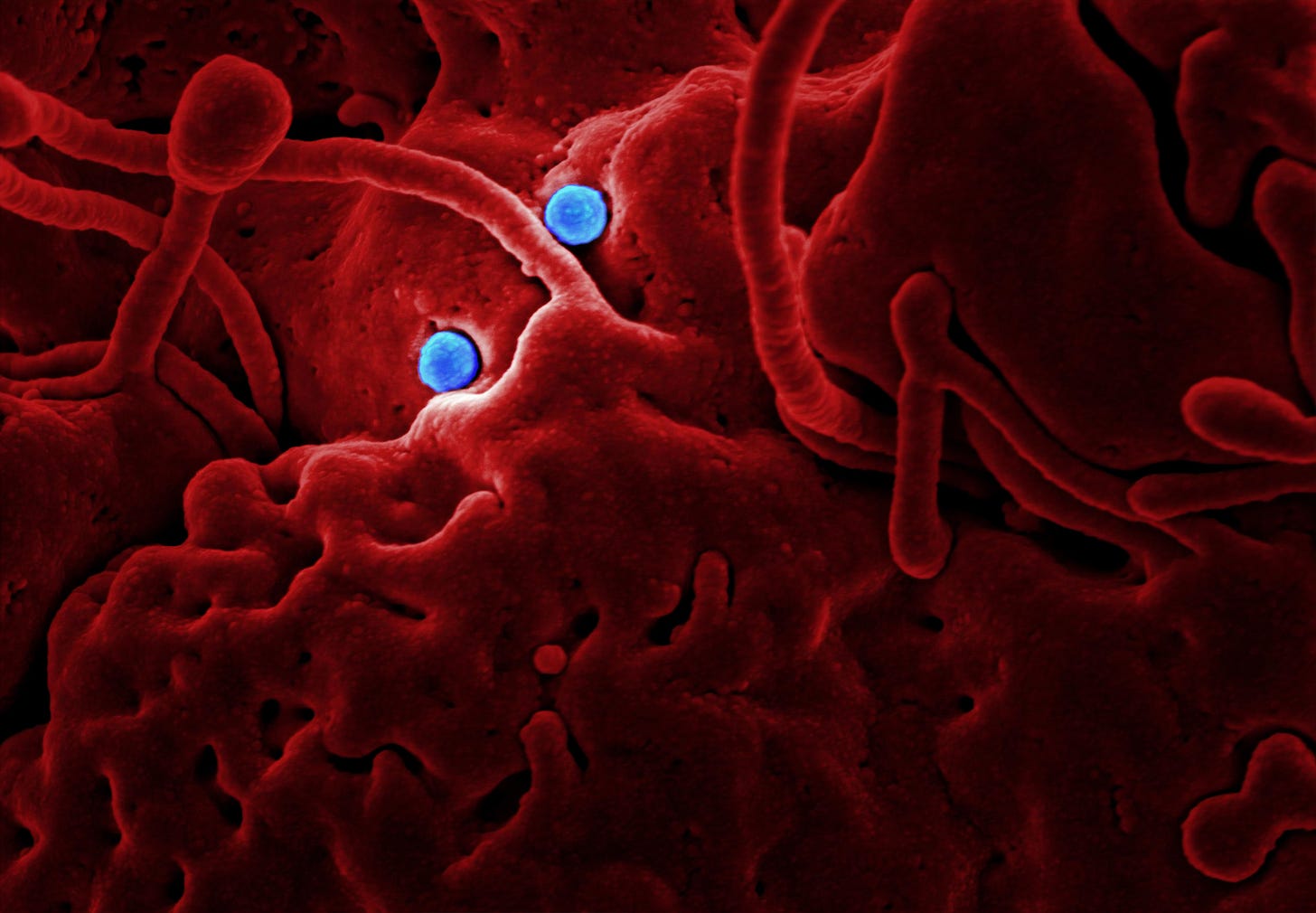Virus, virus where art thou hiding.
Would you volunteer to participate in a clinical trial of an antiviral drug cocktail to suppress MS disease activity, in particular smouldering MS?
There is now a reasonable body of evidence in the literature that human endogenous retroviruses (HERVs) may play a role in autoimmunity, in particular MS. HERVs are viruses (genetic code) that have been incorporated into the human genome over deep time. Some genetic elements from HERVs have taken on important functional roles, for example, they are involved in the development of the placenta and hence are part of our human biology.
When HERVs elements are transcribed they may be capable of forming so-called replication-competent viruses, which can reinfect cells and then integrate them back into the genome. These reintegration sites may be important in themselves and may enhance the function of individual cells and hence drive the selection of cells within the body. These processes may underlie the development of autoimmunity and even some cancers. Other HERV elements are replication-incompetent and although they can produce functional transcripts (RNA) and proteins they can’t form an infectious virus.
Some HERV proteins act as danger signals activating so-called toll-like receptors and other danger-signalling pathways. These pathways then upregulate innate immunity and provide the immunological nudge that drives autoimmunity. This is why there have been some attempts to try and suppress HERV activation with antiviral drugs or to neutralise some of the HERV proteins that may activate the immune system, or are directly toxic to myelin-producing cells and/or neurones, as a treatment for MS.
These HERV-related MS hypotheses are supported by several studies showing upregulation of HERVs transcripts and HERV proteins in the brains of people with MS. A study that used a technology called next-generation RNA sequencing showed that some HERV-W (a specific type of HERV) transcripts are exclusively present in MS brains and as they are located on chromosome 7 close to one of the MS genetic risk loci may be relevant to MS (Elkjaer et al. Mult Scler. 2021 Jan 19;1352458520987269). This finding may be part of the proof we need to show that HERV-W may be in the causal pathway that leads to the development of MS. Importantly, HERV transcripts (RNA message) close to the MS risk locus on chromosome 7 were overrepresented in MS brains.
Although some would interpret these findings as being potentially causal, i.e. HERV transactivation and expression is driving the pathology that is MS, another interpretation is that whatever causes MS transactivates HERVs, which is then simply a bystander phenomenon. The only way to separate ‘causation’ from ‘association’ is to do an experiment to suppress HERV transactivation to see if it improves MS outcomes. This is a conclusion that Prof. Julian Gold, an Australian HIV expert, and I came to several years ago and that is why we have, and are still, trying to get funding to do a CNS penetrant combination antiretroviral trial in MS.
Some of the cynics will ask ‘well what about your EBV hypothesis’? Interestingly, EBV and some of the other herpes viruses are potent transactivators of HERVs, i.e. infection with EBV wakes up HERVs in our genome and results in their transcription. Therefore, increased HERVs expression may simply be a downstream marker of EBV infection. This may be important, but recent data indicates that some of the antiretroviral drugs in HAART (highly active antiretroviral therapies) are also effective against EBV (). Therefore, clinical trials of HAART may actually target both EBV and HERVs. This is why I am so excited about the news that a small HAART trial in MS will be starting soon in the US. However, Prof. Julian Gold and I, as part of our Charcot Project, will still continue to prod and encourage big Pharma companies (ViiV-GSK, Gilead, Merck, etc.) with a footprint in the antiretroviral space, to come to the table with their products (HAART) and money to fund a large adequately powered study to test the hypothesis in a definitive MS study.
I am not sure if you are aware that we showed that people who are infected with HIV-1 (human immunodeficiency virus) and are taking HAART are protected against getting MS. We don’t think this is due to HIV infection, but rather the fact that these people are on long-term antiretrovirals. This is another critical piece of evidence to support the viral aetiology of MS.
What about people who have MS and start HAART? We wrote up a single case report of a patient with quite active MS who became HIV positive and his MS went into remission when he started HAART (Maruszak et al. Eur J Neurol. 2011 Sep;18(9):e110-1.). Since then there have been other reported cases of HAART appearing to work as a DMT in MS (Drosu et al. Mult Scler Relat Disord. 2018 May;22:19-21.). The good news is that we have heard that a small trial of HAART in MS will be starting soon in the USA.
We did a small trial of a single antiviral called raltegravir in MS, which was negative. However, this antiretroviral works as an integrase inhibitor, i.e. it prevents retroviruses from being incorporated into the genome (Gold et al. Mult Scler Relat Disord. 2018 Aug;24:123-128.). This aspect of retroviral biology is likely to be downstream of EBV and HERV biology that is responsible for driving MS disease activity.
It would be a travesty if in 20 years' time the next generation of MS researchers discover that HAART is a very effective treatment for MS when we have the tools to answer this question now, i.e. in the next 4 to 5 years?
Sadly outside-the-box ideas or paradigm shifts often take generations to occur. So don’t be surprised if the wider MS community continues to reject these hypotheses and nothing happens for decades.
So if you know anyone who works for one of the big pharma companies who make antiretrovirals are a wealthy philanthropist please forward this Newsletter to them.
"The one who plants trees, knowing that he will never sit in their shade, has at least started to understand the meaning of life." Rabindranath Tagore
Subscriptions
I am using the paid subscriptions to administer the MS-Selfie Newsletter and associated MS-Selfie microsite that is currently in development. If you are an active paying subscriber thank you, your contribution is much appreciated.
Funds from subscriptions are being used to pay a professional medical writer to curate, rewrite and transfer the contents of the Newsletter onto a companion MS-Selfie microsite, which is being designed and maintained by a freelance web designer.
If you find these Newsletters helpful and want the wider MS community to continue to have access to all content I would encourage you to become a paid subscriber.
Thank you.
General Disclaimer: Please note that the opinions expressed here are those of Professor Giovannoni and do not necessarily reflect the positions of Barts and The London School of Medicine and Dentistry nor Barts Health NHS Trust. The advice is intended as general advice and should not be interpreted as being personal clinical advice. If you have problems please tell your own healthcare professional who will be able to help you.
















Share this post